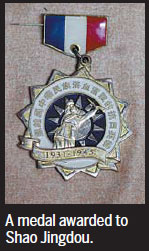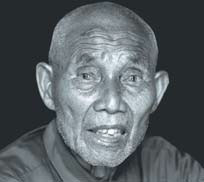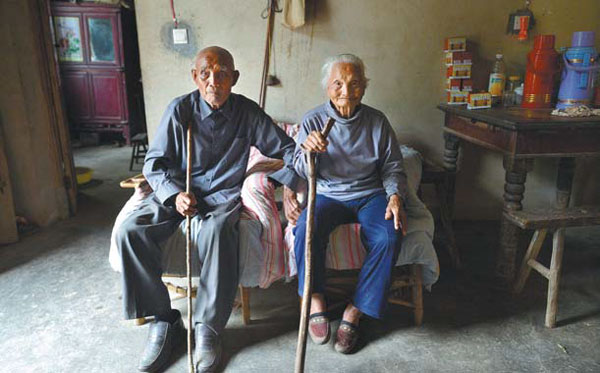A dwindling band of brothers

| Huang Yueyi, 90, was conscripted by the National Revolutionary Army in his hometown in Chaohu, Anhui province, when he was 19. He was one of just a handful of Chinese survivors of a battle in Henan province in which 100 men from his unit were killed. A shell landed at Huang's feet during the battle, but failed to explode. Photos provided to China Daily |
| Huang and his wife. Their children have left home and now work in large cities, so the elderly parents have to fend for themselves, but the task gets harder every day. |
Japan's surrender in August 1945 ended its brutal eight-year occupation of China. Only a handful of Chinese combatants are still alive.
Liu Yuedong wears three bullet scars one each in his back, waist and leg like badges of honor, and his memories of intense battles against the Japanese army are still fresh today. "We had too many fights with them, and scars were simply unavoidable when you had to run against machine-gun fire," says the 91-year-old New Fourth Army veteran, who lives in Hefei.
Liu joined the Communist Party-led army at 12 in 1937. "I was helping my landlord buy some goods one day, but I lost the money on the way to the market. I was too scared to return, so I decided to protect myself by enlisting."

Liu is one of about 20,000 surviving Chinese veterans of the War of Resistance against Japanese Aggression (1937-45).
Many were the sole survivors of entire companies or even battalions. Wang Qichao, 96, was his company's only survivor after the National Revolutionary Army, the military arm of the Kuomintang, tried to defend Wuhan in 1938.
"The shells fell like rain, and our brigade was reduced from more than 2,000 men to nothing," he says, pointing to a bullet scar in his right leg. "The blood flowed like a river, and all the river channels were filled with the bodies. My fellow soldiers died one after another, and I was prepared to die as well. I was so lucky to survive."
After the war, most slipped back into obscurity and, for some, poverty. Volunteer Sun Mian says many, especially soldiers of the Nationalist army, live in bad housing and scrape by, even though Kuomintang veterans were included in the national pension system in 2013.
"What they want is more than just an improvement in their standard of living. Their dearest wish is for national recognition of their heroic deeds," he says.
yan@chinadaily.com.cn


(China Daily European Weekly 08/14/2015 page4)
Today's Top News
- Japan tempting fate if it interferes in the situation of Taiwan Strait
- Stable trade ties benefit China, US
- Experts advocate increasing scope of BRI to include soft power sectors
- New engine powers cargo drone expansion
- China to boost green industry cooperation
- Manufacturing PMI rises in November
































